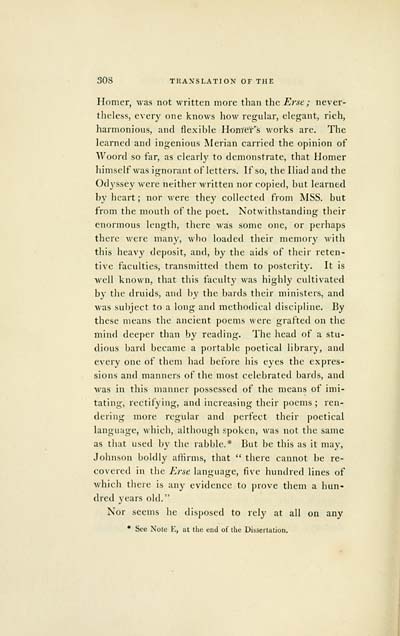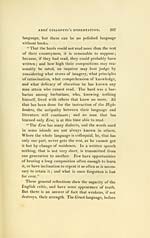J. F. Campbell Collection > Poems of Ossian > Volume 3
(320)
Download files
Complete book:
Individual page:
Thumbnail gallery: Grid view | List view

308 TRANSLATION OF TIIE
Honier, was not writtcn more than the Erse ; never-
theless, every one knows how regular, elegant, rich,
harmonious, and flexible Homev's works are. The
learned and ingenious Merian carricd the opinion of
Woord so f'ar, as clearly to dcmonstrate, that Homer
himself was ignorant of letters. If so, the Iliad and the
Odyssey were neither written nor copied, but learned
by hcart ; nor were they collected from MSS. but
from tlie mouth of the ])Oct. Notwithstandiiig their
enonnous lcngth, tliere M'as sonie one, or perhaps
there wcre niany, who loaded tlieir niemory with
this heavy deposit, and, by tlie aids of their reten-
tive faculties, transmitted them to posterity. It is
weil known, that tliis faculty was highly cultivatcd
by thc druids, and by the bards their ministers, and
was subject to a long and methodical discipline. By
these means the ancient poems wcre grafted on the
mind deeper than by reading. The head of a stu-
dious bard became a portable poetical iibrary, and
every one of them had before his eyes the expres-
sions and manncrs of the most celebrated bards, and
was in this manner possessed of the means of imi-
tating, rectifying, and increasing their poems ; rcn-
dering more rcgular and pcrfect their poetical
language, which, although spoken, was not thc same
as tliat used by the rabble.* But be this as it may,
Johnson boldly aihrms, that " tliere cannot be re-
covercd in tlic Erse language, five hundred lines of
which tliere is any evidence to piove them a hun-
dred years old."
Nor seems he disposcd to rely at all on any
• Sce Note E, at tlie end of tlie Dissertation.
Honier, was not writtcn more than the Erse ; never-
theless, every one knows how regular, elegant, rich,
harmonious, and flexible Homev's works are. The
learned and ingenious Merian carricd the opinion of
Woord so f'ar, as clearly to dcmonstrate, that Homer
himself was ignorant of letters. If so, the Iliad and the
Odyssey were neither written nor copied, but learned
by hcart ; nor were they collected from MSS. but
from tlie mouth of the ])Oct. Notwithstandiiig their
enonnous lcngth, tliere M'as sonie one, or perhaps
there wcre niany, who loaded tlieir niemory with
this heavy deposit, and, by tlie aids of their reten-
tive faculties, transmitted them to posterity. It is
weil known, that tliis faculty was highly cultivatcd
by thc druids, and by the bards their ministers, and
was subject to a long and methodical discipline. By
these means the ancient poems wcre grafted on the
mind deeper than by reading. The head of a stu-
dious bard became a portable poetical iibrary, and
every one of them had before his eyes the expres-
sions and manncrs of the most celebrated bards, and
was in this manner possessed of the means of imi-
tating, rectifying, and increasing their poems ; rcn-
dering more rcgular and pcrfect their poetical
language, which, although spoken, was not thc same
as tliat used by the rabble.* But be this as it may,
Johnson boldly aihrms, that " tliere cannot be re-
covercd in tlic Erse language, five hundred lines of
which tliere is any evidence to piove them a hun-
dred years old."
Nor seems he disposcd to rely at all on any
• Sce Note E, at tlie end of tlie Dissertation.
Set display mode to: Large image | Transcription
Images and transcriptions on this page, including medium image downloads, may be used under the Creative Commons Attribution 4.0 International Licence unless otherwise stated. ![]()
| Early Gaelic Book Collections > J. F. Campbell Collection > Poems of Ossian > Volume 3 > (320) |
|---|
| Permanent URL | https://digital.nls.uk/81285592 |
|---|
| Description | Vol. III. |
|---|---|
| Shelfmark | Cam.1.b.5 |
| Additional NLS resources: | |
| Attribution and copyright: |
|
| Description | Volumes from a collection of 610 books rich in Highland folklore, Ossianic literature and other Celtic subjects. Many of the books annotated by John Francis Campbell of Islay, who assembled the collection. |
|---|
| Description | Selected items from five 'Special and Named Printed Collections'. Includes books in Gaelic and other Celtic languages, works about the Gaels, their languages, literature, culture and history. |
|---|

